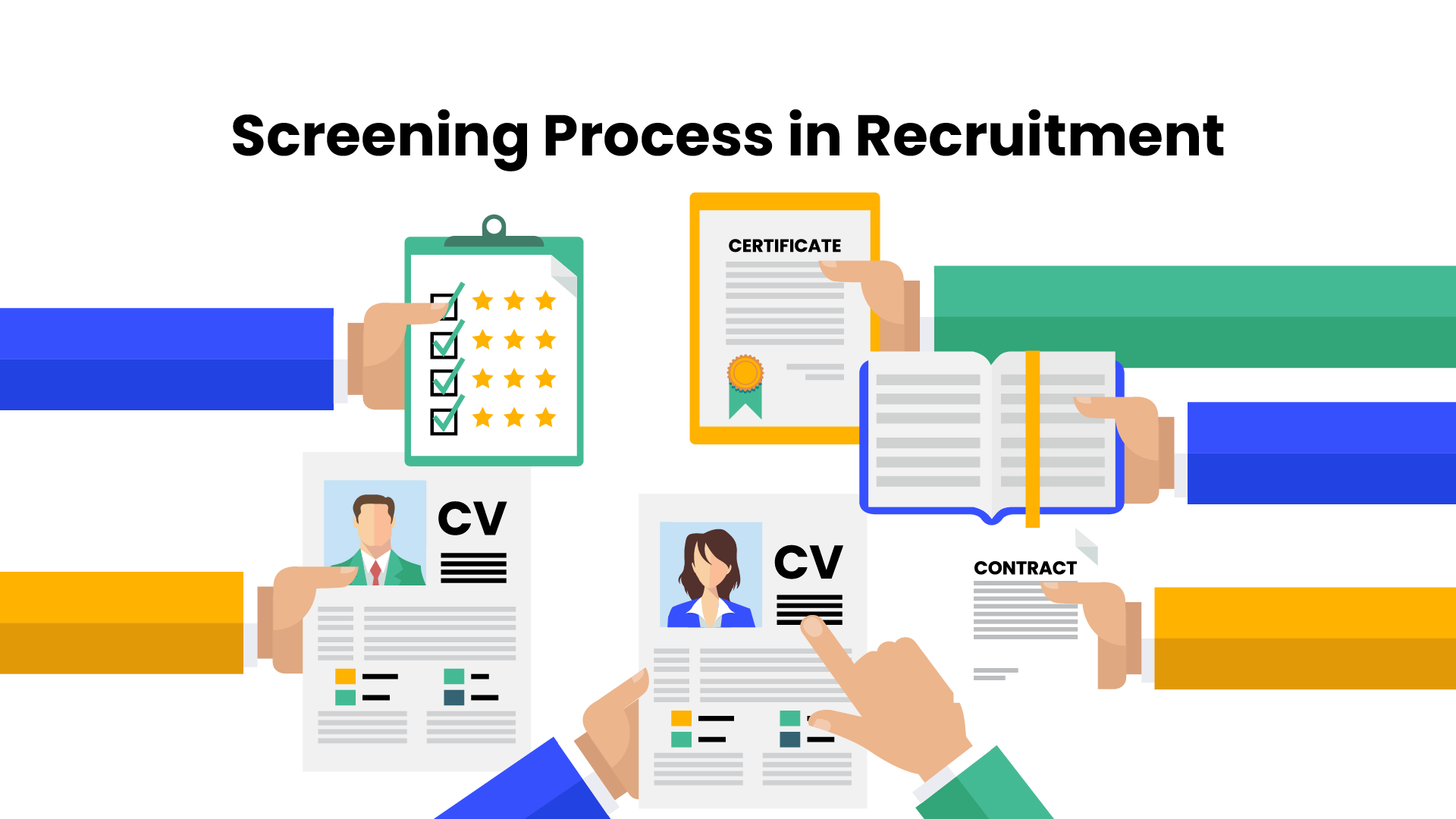
Learn the five most common screening methods, why they matter, and how the right tools help teams hire faster with clearer decisions.

Healthcare hiring is harder than ever. With staff shortages, strict compliance rules, and high turnover, every delay puts patient care at risk.
The fix? Candidate screening software. It speeds up hiring, reduces errors, and ensures only qualified staff make it through the process. In this article, we’ll share the top five candidate screening software solutions that can help healthcare organizations streamline hiring and build stronger care teams.
Recruiting for healthcare roles comes with unique obstacles that directly affect patient outcomes and organizational stability. Below are the key challenges HR teams face when trying to hire qualified staff quickly and effectively.
Hospitals and clinics often see sudden spikes in patient numbers during flu season or emergencies.
As reported by JAMA Network, during the 2017–2018 influenza season U.S. hospitals faced heavy strain on staff, patient care, and capacity because of prolonged high volumes. These surges forced recruiters to fill multiple roles at once, often with limited time. When gaps remained, patient care slowed and existing staff faced burnout.
Recruiters must ensure every hire has the right licenses, certifications, and training. A 2023 MGMA survey found that 67% of medical groups faced onboarding delays from credentialing, with an average wait of 60 to 90 days. These checks often require coordination with multiple agencies, which slows the process.
A HireRight study showed that nearly 40% of candidate fraud cases involved false education or credentialing, making compliance checks even more important.
Technical skills matter, but so do traits like communication, empathy, and teamwork. Many recruiters struggle to assess these consistently.
A survey reported that 85% of hiring managers found false claims on resumes, often about qualifications or past roles. Without reliable checks, hospitals risk hiring people who are not ready for clinical demands.
Research shows that implicit bias is common among healthcare professionals, with 35 out of 42 studies reporting its presence. These biases covered race, ethnicity, gender, age, and weight.
Since higher levels of bias were consistently linked to lower quality of care, it suggests that hiring decisions without clear standards can also be shaped by unconscious bias. This makes fair and consistent candidate evaluation a serious challenge in healthcare recruitment.
See also: 10 Best AI Interview Tools for Reducing Recruitment Costs in Large Organizations
Given the complexity of healthcare hiring, manual processes alone can’t keep up. Candidate screening software helps HR teams close these gaps while improving both speed and quality. Its main benefits include:
Going through resumes and setting up interviews by hand can stretch hiring out for days. AI speeds this up by finishing those steps in minutes and helping teams move quicker. A survey showed that 86.1% of recruiters believe AI makes the hiring process faster, which means hospitals can bring new staff on board without long delays.
Healthcare jobs demand exact qualifications, and manual reviews often miss important details. AI systems can scan thousands of resumes, verify licenses, and flag the strongest matches in minutes instead of hours. This accuracy helps recruiters focus on the right people from the start.
Candidates selected through AI screening are also 14% more likely to pass interviews, showing that the technology doesn’t just save time but also improves hiring quality.
Even trained managers can make biased decisions without realizing it. Automated screening removes personal details and applies the same criteria to every applicant. One study found that women had a 69% lower chance of being shortlisted, but automated systems reduced that gap by 43 percentage points, leading to more diverse candidate pools.
Healthcare hiring is bound by strict rules on licenses and background checks. Manual credentialing is risky, with 85% of applications missing important details when done by hand. Automation fixes this by verifying primary sources in seconds, and hospitals using it report 20% faster credentialing timelines.
A confusing hiring process leaves candidates frustrated and more likely to walk away. Automation makes the journey smoother by reducing extra steps and keeping communication clear. Research shows that 56% of physicians were satisfied when onboarding was efficient and well organized, compared to only 19% when the process was poorly managed.
See also: How to Measure Candidate Experience (and 6 Topics to Ask About)
With so many solutions on the market, choosing the right platform can be overwhelming. To help, we’ve rounded up five of the best candidate screening software in 2025, each designed to meet the unique demands of healthcare hiring.
The comparison below shows how five leading tools differ in focus and key features.
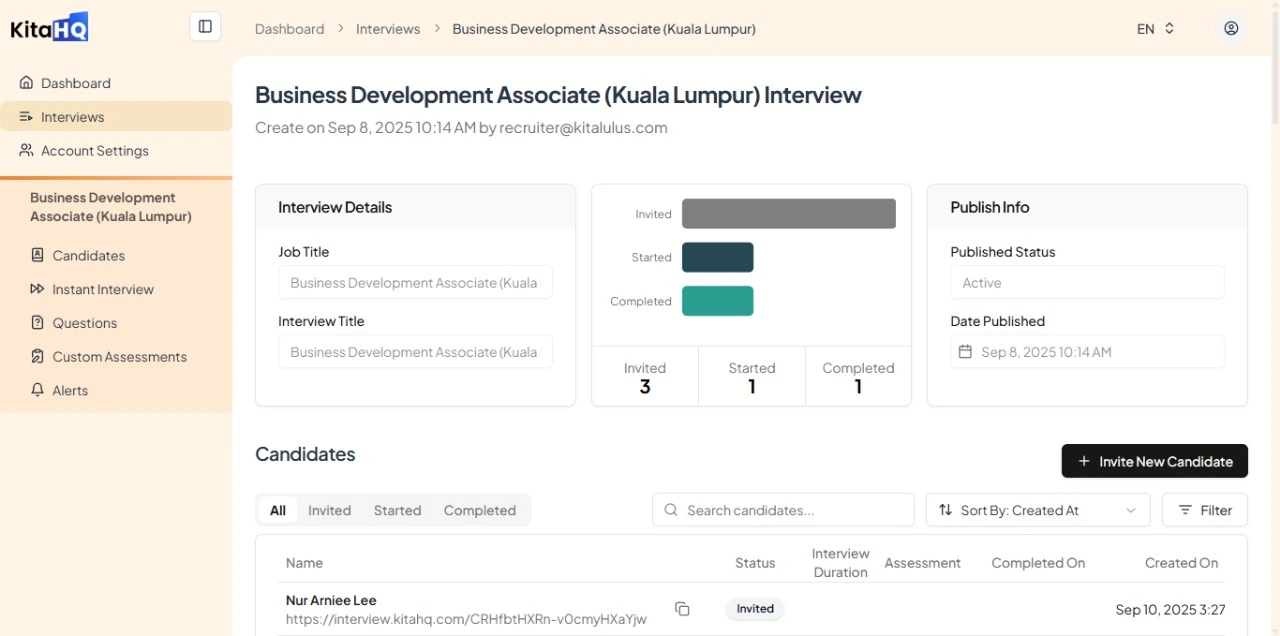
KitaHQ is an AI-powered interviewing and screening platform designed to help recruiters automate early-stage interviews, standardize assessments, and speed up candidate evaluation.
It helps reduce scheduling friction, deliver unbiased insights, and allow HR teams to focus on selecting and engaging the best candidates.
Key features:
Best for:
Pricing:
See also: Top 5 Asynchronous Video Interview Platforms Popular Among Singaporean Companies
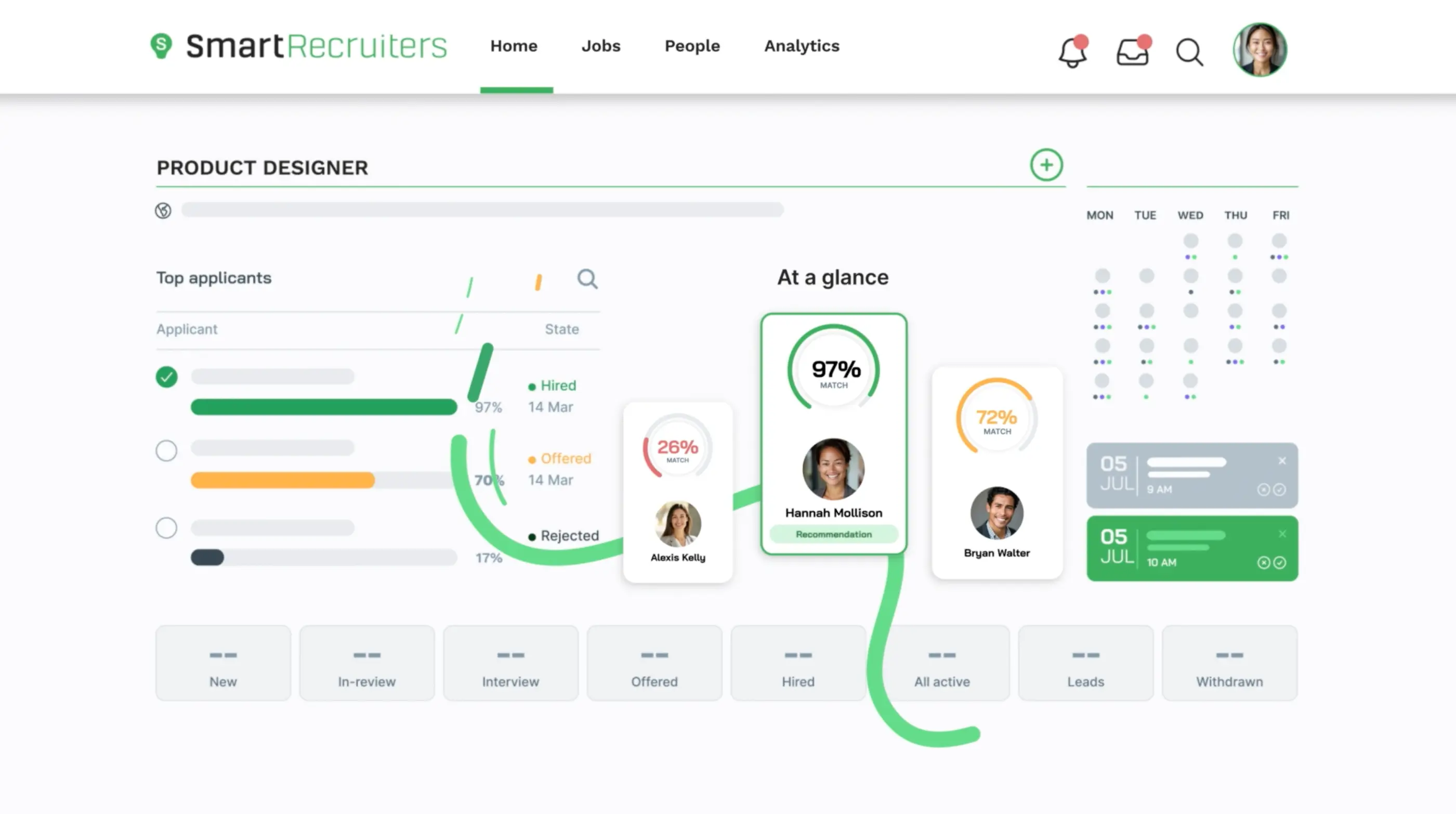
This platform lets recruiters move past old systems and work in a cleaner setup. It pulls hiring needs across regions into one place and makes the whole process easier to handle. You can keep things clear from start to finish without juggling tools.
It links with plenty of services so teams don’t get stuck switching back and forth. Processes stay steady even as hiring grows. Recruiters get to focus on picking the right people instead of wrestling with the system.
Key features:
Best for:
SmartRecruiters serves mid-size to large enterprises with ongoing hiring needs and multiple open positions.
Pricing:
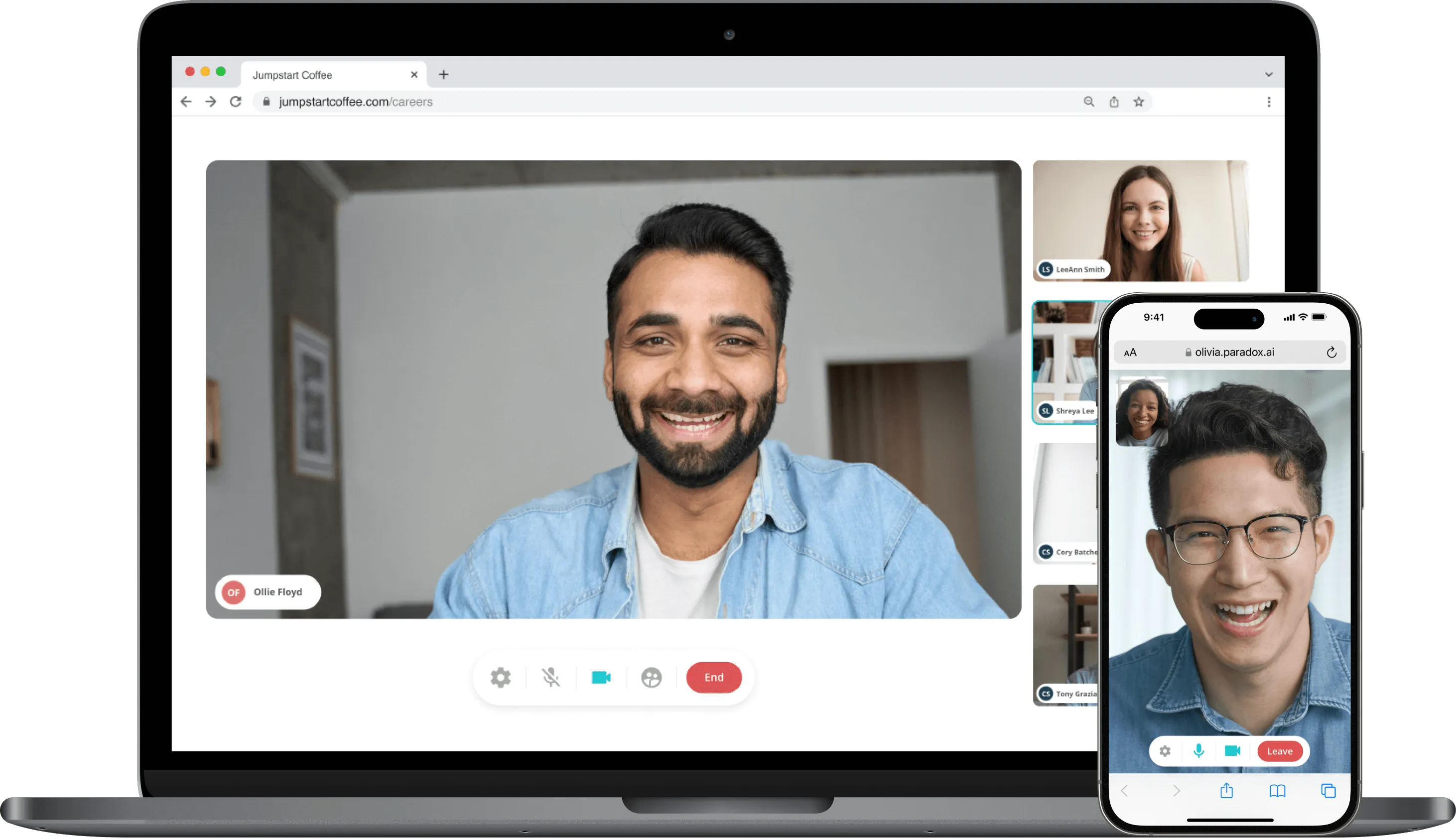
This platform runs on a conversational assistant that screens applicants, sets up interviews, and answers the questions candidates ask most. Recruiters can spend more time talking to people, not chasing schedules.
Candidates can connect by chat, text, or mobile, whatever works best for them. The assistant keeps things moving fast and avoids slowdowns. Hiring feels less stuck and communication stays simple.
Key features:
Best for:
Paradox is built for high-volume hiring, especially in industries like retail, restaurants, healthcare, hospitality, and manufacturing
Pricing:
Paradox uses a custom pricing model. Contact sales for a quote.
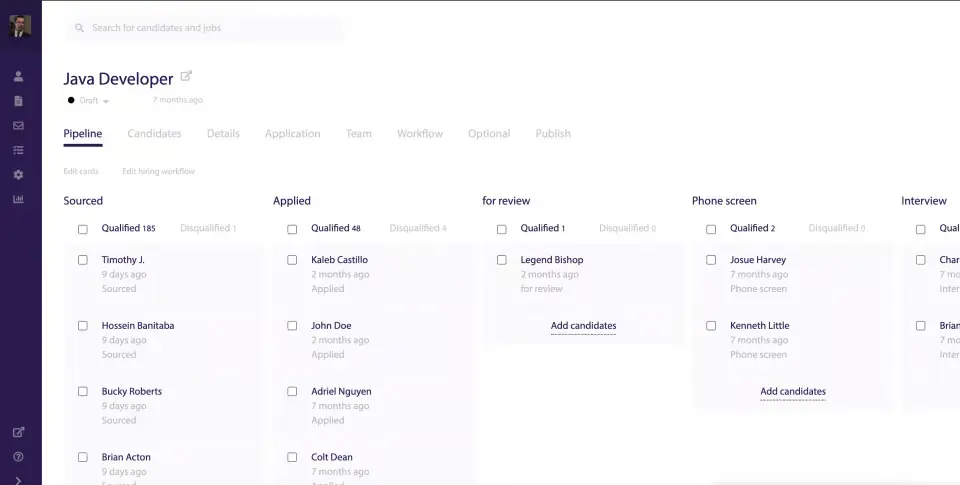
This system makes it easier to share jobs and follow applicants in one place. It cuts down on scattered tasks so recruiters can make decisions quicker. Posting to big job sites doesn’t add extra cost.
Candidate info is stored together so it’s easy to track. Scheduling, reminders, and resumes can run on autopilot. Teams can go from posting a job to securing the right candidate more smoothly.
Key features:
Best for:
100Hires is most suited for small and medium-sized businesses, especially those with up to a few hundred employees, where hiring speed and efficiency matter most.
Pricing:
At the time this article was released, the pricing is:
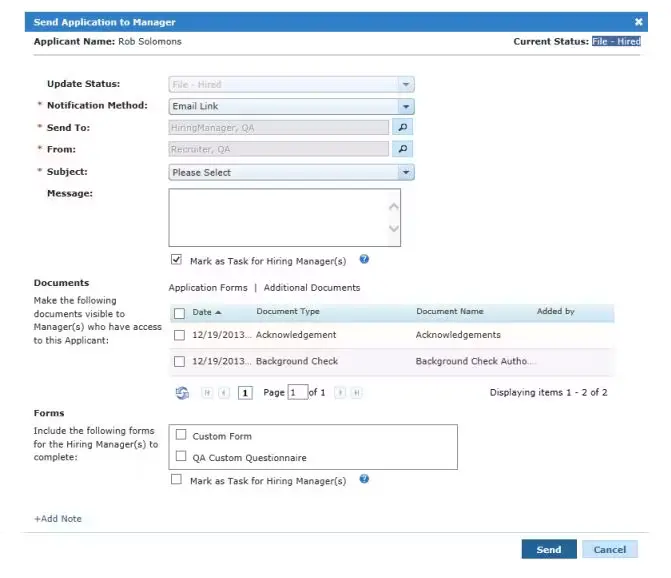
This one’s built for healthcare hiring and covers everything from posting to onboarding. It helps fill roles faster and keeps the process consistent. Recruiters know each step is lined up without extra guesswork.
Manual tasks get reduced so more focus goes to talent. Everything’s handled in one hub, which speeds things up and cuts the gaps. Teams can work through recruiting without as much drag.
Key features:
Best for:
symplr Recruiting fits best with large and complex healthcare organizations, such as hospital systems and health plans.
Pricing:
symplr Recruiting uses a custom pricing model that varies depending on company requirements.
See also: The Importance of Candidate Screening in 2025: A Guide for Employers
Healthcare hiring carries constant pressure, from high turnover to strict compliance and limited time to fill roles. Candidate screening software offers a way to ease that load by cutting manual work, reducing errors, and keeping the process consistent.
The right choice will look different for every organization. Some may need stronger credentialing support, while others want faster ways to manage large volumes of applicants. Taking time to match these priorities with the right platform can make hiring more dependable and less stressful for recruiters.
The platforms highlighted here each bring a different strength, from video interviews to healthcare-focused compliance. For teams slowed down by long interview cycles or inconsistent screening, KitaHQ stands out as a practical option. Its structured video interviews and clear reports make candidate comparisons easier and decisions faster.
Book a demo to see how it could fit your process.
Candidate screening software helps recruiters go through applications faster and with more consistency. It filters resumes, highlights important qualifications, and makes it easier to focus on candidates who are most likely to fit the role.
KitaHQ takes screening a step further by running structured AI-led interviews. It generates interview questions, captures transcripts, and provides fair scoring. Recruiters can compare applicants side by side and move forward with confidence.
Candidate screening software helps healthcare organizations stay compliant by checking licenses, certifications, and background records automatically. It flags expired or invalid credentials and stores everything in one secure place, which makes audits easier. This saves time and helps reduce compliance risks.
It also applies the same rules to every candidate, reducing mistakes and bias. The system keeps records safe, tracks who accessed them, and sends reminders when renewals are due. That way, healthcare providers can meet strict regulations and protect patient safety without adding more manual work.
Yes. Candidate screening software can help reduce bias in the hiring process, but only when used carefully.
These tools often allow anonymous or blind resume review by hiding names, photos, schools, or locations. That helps hiring teams focus on skills and experience rather than assumptions about a candidate’s background.
The software may also use standardized tests and scoring systems, which evaluate everyone by the same criteria. For example, platforms like KitaHQ generate interview questions based on the job description and run AI-structured interviews. Every candidate goes through the same process and their answers are analyzed with the same scoring method.
For healthcare hiring, look for screening software that can verify licenses and certifications, run background and sanction checks, and send alerts when credentials are about to expire. It should also keep records secure, follow local privacy laws like HIPAA in the US, GDPR in Europe, or the PDPA in Singapore and Malaysia, and provide audit trails.
Beyond compliance, strong platforms offer structured assessments, automated pre-screening, and interview tools that apply the same process to every candidate. Integrations with your HR systems, analytics dashboards, and clear communication options help make hiring faster and more consistent.
KitaHQ brings these benefits together by supporting compliance with the PDPA in Singapore and Malaysia as well as the PDPL in Indonesia. It also reduces bias through AI-structured interviews, where every candidate answers the same set of questions and is evaluated with consistent criteria.